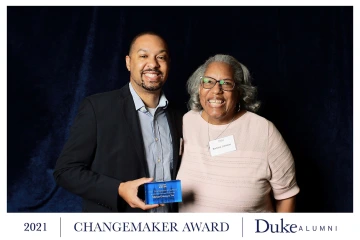Duke Honors Dr. Michael Johnson with Changemaker Award
Michael D.L. Johnson, PhD, was honored with a Duke Alumni Changemaker Award during their Alumni Awards 2021 celebration. Dr. Johnson is an assistant professor of immunobiology at the University of Arizona College of Medicine – Tucson and is a member of the BIO5 Institute. He received his bachelor’s degree from Duke University in 2004 and his doctorate from the University of North Carolina at Chapel Hill.

Dr. Michael Johnson and his mom, Barbara Johnson, at the Duke University Alumni awards ceremony, where Dr. Johnson received the Changemaker Award.
The Changemaker Award was established during the COVID-19 pandemic to recognize and celebrate the exceptional and inspiring efforts of the Duke University community – those who rose above and answered the call to serve their communities in extraordinary ways.
“I have such fond memories of being at Duke, so this was a nice and unexpected honor,” said Dr. Johnson. “It was extra special having my mother there to celebrate the event considering it was just my mom and I growing up and how much she sacrificed for me to be able to go there.”
Dr. Johnson was nominated for the award by Rosalinda C. Canizares, PT, DPT, OCS, SCS, of the Duke University School of Medicine. “When I heard about the new Changemaker Award, Michael was the first person who I thought of,” she said. “I was really excited to learn that he was chosen for the award. It is a well-deserved acknowledgment of the impact that he is having on the next generation.”
Dr. Canizares had not been in touch with Dr. Johnson for years. However, she had been following him on social media where she read about the National Summer Undergraduate Research Project (NSURP), which he established. The program started in June 2020 as a way to create a “virtual matchmaking program” to pair underrepresented minority students with microbiology labs to promote research experience during the COVID-19 pandemic. It gained momentum quickly and grew to more than 250 students and 170 volunteer mentors worldwide for that first eight-week summer session.
“Summer research plays a very large role in ability to pursue STEM graduate programs. Due to the pandemic, minorities who are underrepresent in STEM affected the most by these COVID canceled in-person programs. I wanted to figure out a way to go virtual to help them,” said Dr. Johnson.
With funding from the UArizona Office for Research, Innovation and Impact and a Provost Award for Innovation in Teaching, as well as several grants from the National Science Foundation for nearly $275,000 specifically to offer student stipends, NSURP’s second year this past summer was more targeted, with 66 full-time paid students and 64 mentors. The number of UArizona participants in NSURP included six students and five mentors in 2020 and three students and four mentors in 2021. Seminars, projects and presentations available online illustrate the quality of work completed.
Even as in-person summer programs resumed this past summer, more than 30% of initial participants said they couldn’t attend in-person programs due to various obligations. Dr. Johnson plans to continue NSURP to meet the needs of Latinx and BIPOC (Black, Indigenous and people of color) students. “This is because they may be taking care of loved ones (their parents or children) during the summer and so don’t have the opportunity to travel for a program like this. In that respect, this program bridges the gap and allows them access into the scientific research community,” he said.
NSURP continues to seek any research projects tangential to microbiology and immunology where it can match underrepresented students with mentors. Mentors don’t need to be faculty, Dr. Johnson stressed, they can include graduate trainees, postdoctoral fellows and staff scientists.

